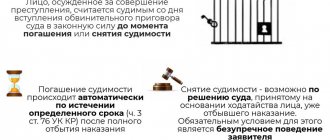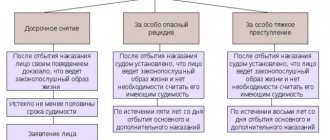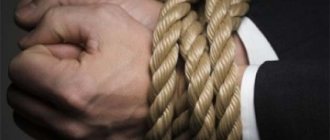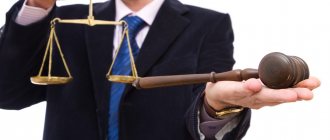The Constitutional Court explained what influences the abolition of a suspended sentence and the expungement of a criminal record
The Constitutional Court published Determination No. 371-O on February 26, in which it indicated that the abolition of a suspended sentence and the expungement of a criminal record are influenced not only by the fact of compensation for damage, but also by the behavior of the convicted person.
On August 31, 2021, Nikolay Durasov and K. were found guilty of committing a crime under Part 4 of Art. 159 “Fraud” of the Criminal Code of the Russian Federation. At the same time, K. was sentenced to four years of suspended imprisonment with a probationary period of three years. The court also decided to collect 4 million rubles from the convicted persons jointly and severally. to compensate for damage caused by the crime. After the verdict came into force, Nikolai Durasov compensated the amount of damage caused in full.
By the decision of the district court dated December 16, 2021, Durasov’s claims were satisfied in terms of recovering from K. by way of recourse half of the funds he paid for damages - 2 million rubles. On March 18, 2021, the criminal-executive inspection sent K.’s petition to the court to cancel her suspended sentence and to remove her criminal record, which was granted on May 14 of the same year. Nikolai Durasov considered that K. misled the court regarding the circumstances of compensation for the damage caused by the crime, and filed an appeal, which was returned with an explanation that he was not a participant in the criminal process when considering such a petition. His cassation appeal was also returned due to the fact that the appealed decision did not affect his rights and legitimate interests.
Nikolai Durasov appealed to the Constitutional Court with a complaint about the inconsistency of Part 1 of Art. 389.1 “Right of appeal”, Part 4 of Art. 389.6 “Appeal, presentation” and part 4 of Art. 400 “Consideration of a petition to expunge a criminal record” of the Code of Criminal Procedure. In his opinion, these norms allow the court to arbitrarily determine the circle of persons participating in the trial on the revocation of a suspended sentence, as well as those who have the right to challenge the decision made as a result of it.
Official website of the Supreme Court of the Russian Federation
To replace a suspended sentence with a real one, if there is little agreement with the prosecutor’s office, the courts are required to justify why they consider it possible to correct the accused only in conditions of isolation from society and provide convincing arguments for their position, notes the Supreme Court of the Russian Federation.
The highest court examined the case of a lawyer convicted of attempted fraud and not only agreed with the arguments of the defense complaint, but also released the accused from custody.
The crux of the matter
A lawyer from Ufa received a suspended three-year prison sentence. However, the state prosecution filed an appeal, in which it raised the issue of the injustice of the sentence and the unreasonable application of the provisions of Article 73 of the Criminal Code of the Russian Federation to the accused. The prosecutor's office considered that the court did not take into account the essential circumstances of the crime and the identity of the convicted person, the lack of repentance and the defendant's critical attitude towards the crime. In this connection, according to the state prosecution, the appointment of a suspended sentence to the lawyer is illegal and overly lenient.
The Supreme Court of Bashkortostan agreed with this position and changed the term to a real one, and took the accused into custody.
The appellate instance pointed out that the court’s verdict did not provide the circumstances on the basis of which the conclusion was made “about the possibility of correcting the convicted person without actually serving a sentence of imprisonment.”
Taking into account the nature and degree of public danger of the crime, the judicial panel decided that only a punishment in the form of actual imprisonment would meet the goals of restoring social justice and contribute to the correction of the accused, and on this basis sent a lawyer to serve a sentence of 3 years imprisonment in general regime correctional colony.
The Sixth Court of Cassation of General Jurisdiction upheld this ruling.
Position of the Armed Forces
In accordance with the provisions of Article 73 of the Criminal Code of the Russian Federation, if the court comes to the conclusion that it is possible to correct the convicted person without actually serving the sentence, it decides to consider the imposed sentence suspended. In this case, the court takes into account the nature and degree of public danger of the crime committed, the identity of the perpetrator, including mitigating and aggravating circumstances, reminds the Supreme Court.
The court of first instance, assigning a suspended sentence to the lawyer, took into account the nature and degree of public danger of the crime he committed, the impact of the imposed punishment on the correction of the convicted person, information about his personality, which was characterized satisfactorily, the absence of aggravating circumstances and the presence of mitigating circumstances, which included his retirement age, the state of health and the presence of minor children dependent on him is indicated by the highest authority.
“When deciding to change the sentence and cancel the suspended sentence, the appellate court, in violation of the requirements of paragraph 7 of part 3 of Article 389.28 of the Code of Criminal Procedure of the Russian Federation, in its ruling did not provide convincing reasons why it differently assessed the nature and degree of public danger of the crime committed and found It is impossible, taking into account the information about the personality of the convicted person, his correction without actually serving the sentence,” notes the Supreme Court.
In connection with this, the highest court canceled the appeal ruling and sent the case for a new consideration in the Supreme Court of Bashkortostan, changing the defendant’s preventive measure to a written recognizance not to leave.
Controversial fee
In the complaint, the lawyer also insisted on the innocence of his colleague, referring to a telephone conversation of the victim: she herself turned to the convict with a request only for a meeting, during which she asked for legal assistance, and she herself announced the amount of the fee, to which the accused replied to her that if the client is not satisfied with his work, he will return her money.
The complaint notes that there were no conversations about money on the part of the defendant, nor any mention of the judges, and the victim confirmed all the details of the conversation during the trial. However, for some reason the court did not give a proper assessment of this circumstance in its verdict.
The lawyer also believes that the preliminary investigation authorities and the courts distorted the meaning of the conversation between his colleague and his client.
He also draws attention to the fact that at the court hearing the victim explained that she organized all these actions out of revenge on the accused.
According to the defense lawyer, a number of other significant violations were committed during the investigation and trial.
Meanwhile, the Supreme Court did not evaluate these arguments, noting that they should become the subject of investigation by the appellate court.
Alice Fox
Conditions
Removal of a conditional criminal record (that is, its early expungement) is possible under the following conditions:
- At least half of the probationary period has passed. Please note that the calculation takes into account the time of the trial, and not the duration of the assigned suspended sentence.
- The behavior of the convict is impeccable, which is confirmed by the inspector of the Criminal Investigation Department.
- The damage to the victim, if any, is fully compensated.
All conditions must be met, otherwise early removal of a criminal record is impossible. Everything must be supported by documents: certificates, characteristics, receipts, etc.
There are two more opportunities to be cleared of a criminal record early: amnesty and pardon. But the first does not depend in any way on the convicted person, and those sentenced to probation rarely resort to the second because of its specifics.
If the suspended sentence has already expired, then you do not need to take any action - the criminal record will be expunged automatically.
Consequences of probation
When assigning a suspended sentence, the court determines a probationary period for the convicted person. During this period it is necessary:
- go to the “check-ins” with the inspector of the criminal-executive inspection (CII);
- comply with court-ordered restrictions;
- prove your correction in every possible way, for example, get a job, not commit administrative offenses, receive positive references from places of work and residence.
The probationary period is:
- From 6 months to 3 years – when a sentence of imprisonment of up to 1 year is imposed or a more lenient punishment is imposed than imprisonment.
- From 6 months to 5 years – with imprisonment for a term of more than 1 year.
- Within the period of military service remaining on the day the verdict was announced - when imposing a sentence in the form of detention in a disciplinary unit.
The specific period is determined by the court. As a rule, it depends on the severity of the crime committed, its nature and consequences. The personality of the convicted person and his characteristics must also be taken into account. The period is calculated from the moment the sentence enters into force, but the period of time from the announcement of the sentence to its entry into force is subsequently counted towards the probationary period.
Replacing a real punishment with a conditional one does not prevent the imposition of additional punishments, for example, a fine. Additional sentences are served independently. True, the course of their serving and the results, as a rule, affect the assessment of the behavior of the convicted person - whether he is corrected or not.
What restrictions can a court determine for a person along with a suspended sentence:
- prohibition on changing permanent place of residence, place of study and (or) work without notifying the inspector of the Penitentiary Institution;
- ban on visiting certain places;
- the obligation to undergo a certain course of treatment (for alcoholics, drug addicts, substance abusers or people suffering from a sexually transmitted disease);
- obligation to work (get a job);
- obligation to continue learning.
Many people are interested in whether it is possible to travel abroad during the probationary period and, in general, a suspended sentence? Firstly, the court has the right to impose such a restriction, since the list is not exhaustive. The law allows you to establish other prohibitions, restrictions and obligations not specified in the Criminal Code of the Russian Federation. Secondly, traveling abroad if you have a criminal record and, especially, while serving a sentence, will most likely be in question in itself. If there are no such restrictions, then traveling abroad will still need to be agreed upon with the UII inspector. Otherwise, this may be perceived as an attempt to hide or evade the mark in the UII.
Established restrictions and obligations may be canceled, changed or supplemented by the court during the probationary period. To do this, it is enough for the inspector of the Inspectorate to make a corresponding submission to the court.
Probation: what is it?
A conditional punishment presupposes a preventive measure that does not deprive a person of his freedom in full and practically does not limit it. Simply put, the convicted person is not sent to prison. Lives at the same address and is generally able to move freely, communicate and lead a standard lifestyle.
A suspended sentence may be imposed if the punishment:
- is in the form of correctional work;
- is no more than 8 years.
This measure is recognized as one of the most loyal and is usually used in cases where the degree of the crime was not recognized as serious or a minor offense was committed for the first time. A mitigation of punishment is also possible when the perpetrator admits guilt, compensates for the damage and repents. In general, here we are talking about giving a person a kind of chance to improve without applying harsh sanctions to him.
However, one way or another, a suspended sentence is also a criminal record . And behavior during the period of punishment must be prudent and impeccable, otherwise the preventive measure may be revised. In addition, a person is additionally assigned certain responsibilities, and a number of his opportunities and rights are also limited.
Applicability of suspended sentence
Anyone can stumble and break the law, one - out of ignorance, the second - being in a state of passion, the third - succumbing to bad influence. The list of reasons why many law-abiding citizens have crossed the line of what is permitted and become involved in criminal proceedings can be continued for quite a long time, but many of them are united by a number of factors:
- an offense qualified as a criminal offense was committed for the first time ;
- the consequences of the actions are not too severe and the maximum term of imprisonment does not exceed 8 years;
- There are mitigating circumstances that caused the violation of the boundaries of what is permitted.
Defendants who meet the above requirements have not yet become inveterate representatives of the criminal world and, to prevent this from happening, their placement in a colony should be avoided. It's no secret that staying in the domestic penitentiary system is a test that can break a person or turn him into an inveterate criminal.
That is why the correction of those who have not yet had time to join the criminal romance and mentality should be carried out in freedom, under supervision and by imposing a number of restrictions that allow the person to be disciplined.
The suspended sentence was replaced with a real one. How to appeal?
Good afternoon. The suspended sentence was replaced with a real one. How to appeal?
Lawyer Antonov A.P.
Good afternoon
According to Article 74 of the Criminal Code, if, before the expiration of the probationary period, the conditionally convicted person has proven his correction by his behavior, compensated for the damage (in whole or in part) caused by the crime, in the amount determined by the court decision, the court, on the proposal of the body monitoring the behavior of the conditionally convicted person, may decide to revoke a suspended sentence and expunge a convicted person’s criminal record. In this case, the suspended sentence may be revoked after the expiration of at least half of the established probationary period. If a conditionally convicted person has evaded the fulfillment of the duties assigned to him by the court, has evaded compensation for damage (in whole or in part) caused by the crime in the amount determined by the court decision, or has committed a violation of public order for which he was brought to administrative responsibility, the court, upon presentation the body specified in part one of this article may extend the probationary period, but not more than by one year. If a conditionally convicted person, during an extended probation period in connection with his evasion of compensation for damage caused by a crime, in the amount determined by a court decision, systematically evades compensation for said damage, the court, upon the proposal of the body specified in part one of this article, may also make a decision on the revocation of a suspended sentence and the execution of a sentence imposed by a court verdict. If a conditionally convicted person, during the probationary period, systematically violated public order, for which he was brought to administrative responsibility, systematically failed to fulfill the duties assigned to him by the court, or escaped from control, the court, upon the proposal of the body specified in part one of this article, may make a decision to revoke the conditional sentence. conviction and execution of punishment imposed by a court verdict. If a conditionally convicted person commits a crime due to negligence or an intentional crime of minor or medium gravity during the probationary period, the issue of canceling or maintaining the conditional sentence is decided by the court. If a conditionally convicted person commits an intentional grave or especially grave crime during the probationary period, the court revokes the conditional sentence and imposes a punishment on him according to the rules provided for in Article 70 of this Code. According to the same rules, punishment is imposed in cases provided for in part four of this article. The rules established by parts four and five of this article also apply if the crimes specified in these parts were committed before the sentence providing for a suspended sentence came into force. In this case, trial of a new crime can take place only after the sentence providing for a suspended sentence has entered into legal force. According to Article 389.1-389.6 of the Criminal Procedure Code, the right to appeal a court decision belongs to the convicted, acquitted, their defenders and legal representatives, the public prosecutor and (or) a superior prosecutor, the victim, the private prosecutor, their legal representatives and representatives, and also to other persons to the extent that the appealed court decision affects their rights and legitimate interests. A civil plaintiff, civil defendant or their legal representatives and representatives have the right to appeal a court decision insofar as it relates to the civil claim. In accordance with the requirements of this chapter, decisions of the court of first instance that have not entered into legal force may be appealed by the parties on appeal. Determinations or decisions on the procedure for examining evidence, on satisfying or rejecting petitions of participants in the trial and other court decisions made during the trial are appealed on appeal simultaneously with the appeal of the final court decision in the case, with the exception of court decisions specified in part three of this articles. Before the final court decision is made, the magistrate's decisions to return the application to the person who filed it or to refuse to accept the application for proceedings are subject to appeal; court decisions or rulings on the selection of a preventive measure or on the extension of its validity, on the placement of a person in a medical organization providing medical care in an inpatient setting, or in a medical organization providing psychiatric care in an inpatient setting, for conducting a forensic examination, on the seizure of property, on establishing or extending the period of arrest imposed on property, on suspending a criminal case, on transferring a criminal case to jurisdiction or on changing the jurisdiction of a criminal case, on returning a criminal case to the prosecutor; other court decisions affecting the rights of citizens to access justice and to consider a case within a reasonable time and preventing further progress of the case, as well as private rulings or decisions. An appeal against a ruling or ruling made during a trial does not suspend the trial. An appeal or presentation is brought through the court that rendered the sentence or issued another appealed court decision. An appeal or presentation is filed: 1) against a sentence or other decision of a magistrate - to the district court; 2) for a verdict or other decision of a district court, garrison military court - to the judicial collegium for criminal cases of the supreme court of the republic, regional or regional court, court of a federal city, court of an autonomous region, court of an autonomous district, district (naval) military court; 3) for an interim decision of the supreme court of a republic, a regional or regional court, a court of a federal city, a court of an autonomous region, a court of an autonomous district, a district (naval) military court - to the judicial panel for criminal cases of the corresponding court; 4) for a verdict or other final decision of the supreme court of a republic, a regional or regional court, a court of a federal city, a court of an autonomous region, a court of an autonomous district, a district (naval) military court - respectively, to the Judicial Collegium for Criminal Cases of the Supreme Court of the Russian Federation, the Judicial Collegium for Military Personnel of the Supreme Court of the Russian Federation; 5) against the decision of a judge of the Supreme Court of the Russian Federation - to the Appeal Board of the Supreme Court of the Russian Federation. An appeal, submission against a sentence or other decision of the court of first instance can be filed within 10 days from the date of the verdict or other court decision, and for a convicted person in custody - within the same period from the date of delivery of copies of the sentence, ruling, resolutions. During the period established for appealing a court decision, the criminal case cannot be recalled from the court. Appeals or submissions filed after missing the deadline are left without consideration. An appeal or presentation must contain: 1) the name of the appellate court to which the complaint or presentation is filed; 2) information about the person who filed the appeal or presentation, indicating his procedural status, place of residence or location; 3) an indication of the verdict or other court decision and the name of the court that decided or issued it; 4) the arguments of the person who filed the appeal or presentation, indicating the grounds provided for in Article 389.15 of this Code; 5) a list of materials attached to the appeal or presentation; 6) signature of the person who filed the appeal or presentation. The person who filed the appeal or presentation, in support of the arguments presented in the complaint or presentation, has the right to file a petition for the court of appeal to examine the evidence that was examined by the court of first instance, which must be indicated in the complaint or presentation, and provide a list of witnesses, experts and others persons subject to summons for this purpose to the court hearing. If a request is made to examine evidence that was not examined by the court of first instance (new evidence), then the person is obliged to justify in the appeal or presentation the impossibility of presenting this evidence to the court of first instance. The appeal of a person not participating in the criminal case must indicate what rights and legitimate interests of this person were violated by the court decision. If a convicted person applies for participation in the consideration of a criminal case by an appellate court, this is indicated in his appeal or in objections to complaints and submissions brought by other participants in the criminal process. If the appeal or presentation does not comply with the requirements established by parts one, one.1 and second of this article, which prevents the consideration of the criminal case, the appeal or presentation is returned by the judge, who sets a deadline for their re-drafting. If the judge’s requirements are not met and the appeal or presentation is not received within the time limit set by the judge, they are considered not filed. In this case, the verdict or other appealed court decision is considered to have entered into legal force. According to Article 389.15-389.18 of the Criminal Procedure Code, the grounds for canceling or changing a court decision on appeal are: 1) discrepancy between the court’s conclusions set out in the verdict and the actual circumstances of the criminal case established by the court of first instance; 2) a significant violation of the criminal procedure law; 3) incorrect application of criminal law; 4) unfairness of the sentence; 5) identification of the circumstances specified in part one and paragraph 1 of part one.2 of Article 237 of this Code; 6) identification of data indicating a person’s non-compliance with the conditions and his failure to fulfill obligations stipulated by the pre-trial cooperation agreement. The verdict is recognized as inconsistent with the factual circumstances of the criminal case established by the court of first instance if: 1) the court's conclusions are not confirmed by the evidence considered at the court hearing; 2) the court did not take into account circumstances that could significantly influence the court’s conclusions; 3) the verdict does not indicate on what grounds, in the presence of contradictory evidence that is significant for the court’s conclusions, the court accepted some of this evidence and rejected others; 4) the court’s conclusions set out in the verdict contain significant contradictions that influenced or could influence the resolution of the issue of guilt or innocence of the convicted or acquitted person, the correct application of the criminal law or the determination of the penalty. The grounds for canceling or changing a court decision by a court of appeal are significant violations of the criminal procedural law, which, by depriving or limiting the rights of participants in criminal proceedings guaranteed by this Code, non-compliance with the judicial procedure, or in any other way, influenced or could influence the adoption of a lawful and justified judicial decision. The grounds for canceling or changing a court decision in any case are: 1) non-termination of a criminal case by the court if there are grounds provided for in Article 254 of this Code; 2) a court rendering a decision by an illegal composition of the court or a verdict by an illegal composition of a jury; 3) consideration of a criminal case in the absence of the defendant, with the exception of cases provided for in parts four and five of Article 247 of this Code; 4) consideration of a criminal case without the participation of a defense attorney, if his participation is mandatory in accordance with this Code, or in other violation of the right of the accused to benefit from the assistance of a defense attorney; 5) violation of the defendant’s right to testify in his native language or a language he speaks and to use the assistance of an interpreter; 6) failure to provide the defendant with the right to participate in the debate between the parties; 7) failure to give the defendant the last word; violation of the secrecy of the jury's deliberations when rendering a verdict or the secrecy of the judges' deliberations when rendering a verdict; 9) substantiation of the verdict by evidence declared inadmissible by the court; 10) absence of signature of the judge or one of the judges, if the criminal case was considered by the court collectively, on the corresponding court decision; 11) lack of minutes of the court hearing. Incorrect application of the criminal law is: 1) violation of the requirements of the General Part of the Criminal Code of the Russian Federation; 2) application of the wrong article or the wrong paragraph and (or) part of the article of the Special Part of the Criminal Code of the Russian Federation that were subject to application; 3) imposition of a punishment more severe than that provided for in the relevant article of the Special Part of the Criminal Code of the Russian Federation. An unjust sentence is one for which a punishment was imposed that does not correspond to the gravity of the crime, the personality of the convicted person, or a punishment that, although it does not go beyond the limits provided for by the relevant article of the Special Part of the Criminal Code of the Russian Federation, is unfair in its type or size due to excessive softness, and due to excessive severity. Thus, an appeal may be filed against a court decision to revoke a suspended sentence. However, it is necessary to pay attention to cases where, after committing a crime, it is impossible to maintain a suspended sentence.
In this case, the suspended sentence may be revoked after the expiration of at least half of the established probationary period. If a conditionally convicted person has evaded the fulfillment of the duties assigned to him by the court, has evaded compensation for damage (in whole or in part) caused by the crime in the amount determined by the court decision, or has committed a violation of public order for which he was brought to administrative responsibility, the court, upon presentation the body specified in part one of this article may extend the probationary period, but not more than by one year. If a conditionally convicted person, during an extended probation period in connection with his evasion of compensation for damage caused by a crime, in the amount determined by a court decision, systematically evades compensation for said damage, the court, upon the proposal of the body specified in part one of this article, may also make a decision on the revocation of a suspended sentence and the execution of a sentence imposed by a court verdict. If a conditionally convicted person, during the probationary period, systematically violated public order, for which he was brought to administrative responsibility, systematically failed to fulfill the duties assigned to him by the court, or escaped from control, the court, upon the proposal of the body specified in part one of this article, may make a decision to revoke the conditional sentence. conviction and execution of punishment imposed by a court verdict. If a conditionally convicted person commits a crime due to negligence or an intentional crime of minor or medium gravity during the probationary period, the issue of canceling or maintaining the conditional sentence is decided by the court. If a conditionally convicted person commits an intentional grave or especially grave crime during the probationary period, the court revokes the conditional sentence and imposes a punishment on him according to the rules provided for in Article 70 of this Code. According to the same rules, punishment is imposed in cases provided for in part four of this article. The rules established by parts four and five of this article also apply if the crimes specified in these parts were committed before the sentence providing for a suspended sentence came into force. In this case, trial of a new crime can take place only after the sentence providing for a suspended sentence has entered into legal force. According to Article 389.1-389.6 of the Criminal Procedure Code, the right to appeal a court decision belongs to the convicted, acquitted, their defenders and legal representatives, the public prosecutor and (or) a superior prosecutor, the victim, the private prosecutor, their legal representatives and representatives, and also to other persons to the extent that the appealed court decision affects their rights and legitimate interests. A civil plaintiff, civil defendant or their legal representatives and representatives have the right to appeal a court decision insofar as it relates to the civil claim. In accordance with the requirements of this chapter, decisions of the court of first instance that have not entered into legal force may be appealed by the parties on appeal. Determinations or decisions on the procedure for examining evidence, on satisfying or rejecting petitions of participants in the trial and other court decisions made during the trial are appealed on appeal simultaneously with the appeal of the final court decision in the case, with the exception of court decisions specified in part three of this articles. Before the final court decision is made, the magistrate's decisions to return the application to the person who filed it or to refuse to accept the application for proceedings are subject to appeal; court decisions or rulings on the selection of a preventive measure or on the extension of its validity, on the placement of a person in a medical organization providing medical care in an inpatient setting, or in a medical organization providing psychiatric care in an inpatient setting, for conducting a forensic examination, on the seizure of property, on establishing or extending the period of arrest imposed on property, on suspending a criminal case, on transferring a criminal case to jurisdiction or on changing the jurisdiction of a criminal case, on returning a criminal case to the prosecutor; other court decisions affecting the rights of citizens to access justice and to consider a case within a reasonable time and preventing further progress of the case, as well as private rulings or decisions. An appeal against a ruling or ruling made during a trial does not suspend the trial. An appeal or presentation is brought through the court that rendered the sentence or issued another appealed court decision. An appeal or presentation is filed: 1) against a sentence or other decision of a magistrate - to the district court; 2) for a verdict or other decision of a district court, garrison military court - to the judicial collegium for criminal cases of the supreme court of the republic, regional or regional court, court of a federal city, court of an autonomous region, court of an autonomous district, district (naval) military court; 3) for an interim decision of the supreme court of a republic, a regional or regional court, a court of a federal city, a court of an autonomous region, a court of an autonomous district, a district (naval) military court - to the judicial panel for criminal cases of the corresponding court; 4) for a verdict or other final decision of the supreme court of a republic, a regional or regional court, a court of a federal city, a court of an autonomous region, a court of an autonomous district, a district (naval) military court - respectively, to the Judicial Collegium for Criminal Cases of the Supreme Court of the Russian Federation, the Judicial Collegium for Military Personnel of the Supreme Court of the Russian Federation; 5) against the decision of a judge of the Supreme Court of the Russian Federation - to the Appeal Board of the Supreme Court of the Russian Federation. An appeal, submission against a sentence or other decision of the court of first instance can be filed within 10 days from the date of the verdict or other court decision, and for a convicted person in custody - within the same period from the date of delivery of copies of the sentence, ruling, resolutions. During the period established for appealing a court decision, the criminal case cannot be recalled from the court. Appeals or submissions filed after missing the deadline are left without consideration. An appeal or presentation must contain: 1) the name of the appellate court to which the complaint or presentation is filed; 2) information about the person who filed the appeal or presentation, indicating his procedural status, place of residence or location; 3) an indication of the verdict or other court decision and the name of the court that decided or issued it; 4) the arguments of the person who filed the appeal or presentation, indicating the grounds provided for in Article 389.15 of this Code; 5) a list of materials attached to the appeal or presentation; 6) signature of the person who filed the appeal or presentation. The person who filed the appeal or presentation, in support of the arguments presented in the complaint or presentation, has the right to file a petition for the court of appeal to examine the evidence that was examined by the court of first instance, which must be indicated in the complaint or presentation, and provide a list of witnesses, experts and others persons subject to summons for this purpose to the court hearing. If a request is made to examine evidence that was not examined by the court of first instance (new evidence), then the person is obliged to justify in the appeal or presentation the impossibility of presenting this evidence to the court of first instance. The appeal of a person not participating in the criminal case must indicate what rights and legitimate interests of this person were violated by the court decision. If a convicted person applies for participation in the consideration of a criminal case by an appellate court, this is indicated in his appeal or in objections to complaints and submissions brought by other participants in the criminal process. If the appeal or presentation does not comply with the requirements established by parts one, one.1 and second of this article, which prevents the consideration of the criminal case, the appeal or presentation is returned by the judge, who sets a deadline for their re-drafting. If the judge’s requirements are not met and the appeal or presentation is not received within the time limit set by the judge, they are considered not filed. In this case, the verdict or other appealed court decision is considered to have entered into legal force. According to Article 389.15-389.18 of the Criminal Procedure Code, the grounds for canceling or changing a court decision on appeal are: 1) discrepancy between the court’s conclusions set out in the verdict and the actual circumstances of the criminal case established by the court of first instance; 2) a significant violation of the criminal procedure law; 3) incorrect application of criminal law; 4) unfairness of the sentence; 5) identification of the circumstances specified in part one and paragraph 1 of part one.2 of Article 237 of this Code; 6) identification of data indicating a person’s non-compliance with the conditions and his failure to fulfill obligations stipulated by the pre-trial cooperation agreement. The verdict is recognized as inconsistent with the factual circumstances of the criminal case established by the court of first instance if: 1) the court's conclusions are not confirmed by the evidence considered at the court hearing; 2) the court did not take into account circumstances that could significantly influence the court’s conclusions; 3) the verdict does not indicate on what grounds, in the presence of contradictory evidence that is significant for the court’s conclusions, the court accepted some of this evidence and rejected others; 4) the court’s conclusions set out in the verdict contain significant contradictions that influenced or could influence the resolution of the issue of guilt or innocence of the convicted or acquitted person, the correct application of the criminal law or the determination of the penalty. The grounds for canceling or changing a court decision by a court of appeal are significant violations of the criminal procedural law, which, by depriving or limiting the rights of participants in criminal proceedings guaranteed by this Code, non-compliance with the judicial procedure, or in any other way, influenced or could influence the adoption of a lawful and justified judicial decision. The grounds for canceling or changing a court decision in any case are: 1) non-termination of a criminal case by the court if there are grounds provided for in Article 254 of this Code; 2) a court rendering a decision by an illegal composition of the court or a verdict by an illegal composition of a jury; 3) consideration of a criminal case in the absence of the defendant, with the exception of cases provided for in parts four and five of Article 247 of this Code; 4) consideration of a criminal case without the participation of a defense attorney, if his participation is mandatory in accordance with this Code, or in other violation of the right of the accused to benefit from the assistance of a defense attorney; 5) violation of the defendant’s right to testify in his native language or a language he speaks and to use the assistance of an interpreter; 6) failure to provide the defendant with the right to participate in the debate between the parties; 7) failure to give the defendant the last word; violation of the secrecy of the jury's deliberations when rendering a verdict or the secrecy of the judges' deliberations when rendering a verdict; 9) substantiation of the verdict by evidence declared inadmissible by the court; 10) absence of signature of the judge or one of the judges, if the criminal case was considered by the court collectively, on the corresponding court decision; 11) lack of minutes of the court hearing. Incorrect application of the criminal law is: 1) violation of the requirements of the General Part of the Criminal Code of the Russian Federation; 2) application of the wrong article or the wrong paragraph and (or) part of the article of the Special Part of the Criminal Code of the Russian Federation that were subject to application; 3) imposition of a punishment more severe than that provided for in the relevant article of the Special Part of the Criminal Code of the Russian Federation. An unjust sentence is one for which a punishment was imposed that does not correspond to the gravity of the crime, the personality of the convicted person, or a punishment that, although it does not go beyond the limits provided for by the relevant article of the Special Part of the Criminal Code of the Russian Federation, is unfair in its type or size due to excessive softness, and due to excessive severity. Thus, an appeal may be filed against a court decision to revoke a suspended sentence. However, it is necessary to pay attention to cases where, after committing a crime, it is impossible to maintain a suspended sentence.
Sincerely, lawyer Anatoly Antonov, managing partner of the law firm Antonov and Partners.
Still have questions for your lawyer? Ask them right now here, or call us by phone in Moscow +7 (499) 288-34-32 or in Samara +7 (846) 212-99-71 (24 hours a day), or come to our office for a consultation (by pre-registration)!
Conditions for execution of punishment
Often, after a sentence is passed, a person sentenced to probation is sent home without receiving any explanation as to what to do next.
True, according to the regulations, the perpetrator must be told what actions he needs to perform, however, it also happens that this does not happen. It is important to understand here that the convicted person will be required to regularly report to the appropriate structure . Moreover, the condition must be fulfilled before the completion of the correctional period. If you ignore this rule, then it is quite possible that the court will change the method of punishment, making it more severe.
As for where to register, the procedure takes place at the Criminal Executive Inspectorate. Briefly - UII. Moreover, according to the rules, a person’s personal appearance is not required. After completion of the hearings, the court verdict, one way or another, is sent to a designated institution, where the conditionally convicted person is registered automatically.
The registration procedure is carried out within a maximum of 13 days from the date of the court decision . 10 days are given to appeal the verdict and for it to enter into legal force. After which, the document must be executed within an additional 3 days. Simply put, the information is entered into the UII journal.
But then, a corresponding notification is sent to the address of the convicted person. The paper indicates the time and date of the initial appearance for identification. You should have your passport and those papers with you that will also be indicated in the notice.
Usually a person is invited to a conversation no later than 10 days from the date of registration. If this does not happen, you should contact the UII yourself with the appropriate question.
Immediately at the time of the first visit, the convict will be explained the further procedure. In particular, they will tell you where to report during a suspended sentence and establish the frequency of appearance, if it was not indicated at the court hearing.
Usually the mark is affixed when visiting the same Penal Inspectorate at the place of residence of the convicted person. Personal attendance at the institution is required from 1 to 4 times a month.









